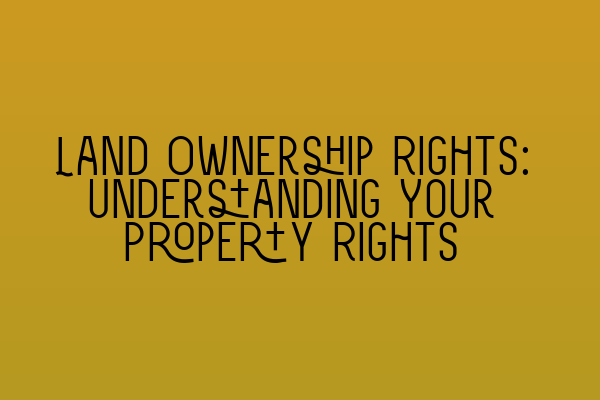Land Ownership Rights: Understanding Your Property Rights
When it comes to land ownership, it’s crucial to have a solid understanding of your property rights. Whether you’re a homeowner, a business owner, or an investor, knowing and protecting your rights is essential. In this blog post, we will delve into the intricacies of land ownership rights and arm you with the knowledge you need to navigate this complex area of law.
At SQE Property Law & Land Law, we are dedicated to providing expert legal guidance and support to clients seeking clarity on their property rights. Our team of experienced solicitors has extensive knowledge in property law and is committed to ensuring that you have a comprehensive understanding of your rights and obligations as a landowner.
Let’s start by exploring the different types of land ownership:
1. Freehold Ownership: This is the most complete form of land ownership. When you own a freehold property, you have full and absolute ownership rights over both the land and any buildings or structures on it. You have the right to use, occupy, and sell the property as you see fit. However, it’s important to note that certain legal restrictions and obligations may apply, such as obtaining planning permission for alterations or adhering to building regulations.
2. Leasehold Ownership: In leasehold ownership, you own the property for a fixed period of time, known as the lease term. Leasehold properties are typically flats or apartments, where multiple units are owned by different leaseholders. As a leaseholder, you have the right to use and occupy the property during the lease term, but the ultimate ownership remains with the freeholder. It is crucial to thoroughly review the terms of your lease agreement to understand your rights and obligations as a leaseholder.
Now, let’s dive deeper into the rights associated with land ownership:
1. Right of Possession: As a landowner, you have the right to exclusive possession of your property. This means that others cannot enter or occupy your land without your permission. However, there may be exceptions to this right, such as easements or rights of way that allow others limited access to your property.
2. Right to Use: You have the right to use and enjoy your property in a manner that is consistent with local laws and regulations. This includes the right to make reasonable alterations and improvements to your property, as long as you comply with any necessary permits or permissions.
3. Right to Transfer: As a landowner, you have the right to sell, transfer, or gift your property to another party. This right allows you to dispose of your land as you see fit, subject to any legal restrictions, such as those imposed by local planning authorities.
4. Right to Exclude Others: You have the right to exclude others from your property, except in certain limited circumstances. For example, if the government exercises its power of compulsory purchase, it may acquire your land for public use, with fair compensation.
5. Right to Receive Rent: If you are a leaseholder, you have the right to receive rent from any sub-tenants who occupy your property. This right is typically outlined in the terms of your lease agreement.
Understanding your property rights is crucial not only for protecting your investment but also for ensuring compliance with legal requirements. At SQE Property Law & Land Law, we can assist you in clarifying and protecting your land ownership rights. Our team of solicitors has extensive experience in property law and is ready to guide you through the intricacies of land ownership.
To further expand your knowledge on contract law and related topics, we highly recommend reading the following articles prepared by our experts at SQE Property Law & Land Law:
– Interactive SQE Mock Tests for Contract Law: Test Your Knowledge
– Parties in a Contract: Rights and Responsibilities
– Unveiling Duress and Undue Influence in Contracts
– Essentials of Consideration: Understanding the Backbone of Contracts
– Damages in Contract Law: Assessing Financial Compensation
By educating yourself on various legal aspects, you will be better equipped to navigate the complexities of land ownership rights and protect your interests. If you have any questions or require legal assistance, please do not hesitate to contact SQE Property Law & Land Law. Our team is here to help you every step of the way.
Note: This blog post is intended for informational purposes only and does not constitute legal advice. Please consult a qualified solicitor for specific legal guidance related to your land ownership rights.
